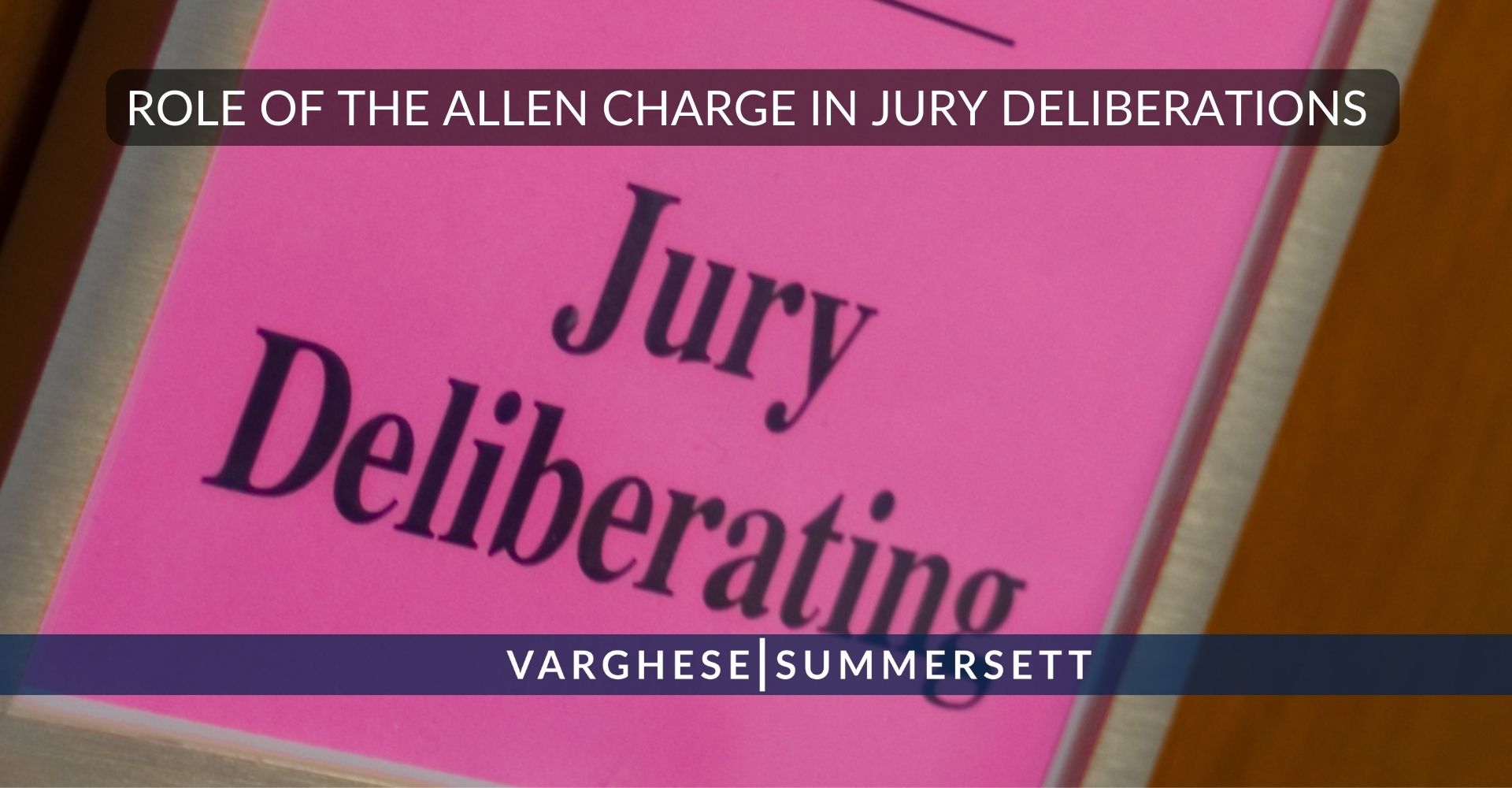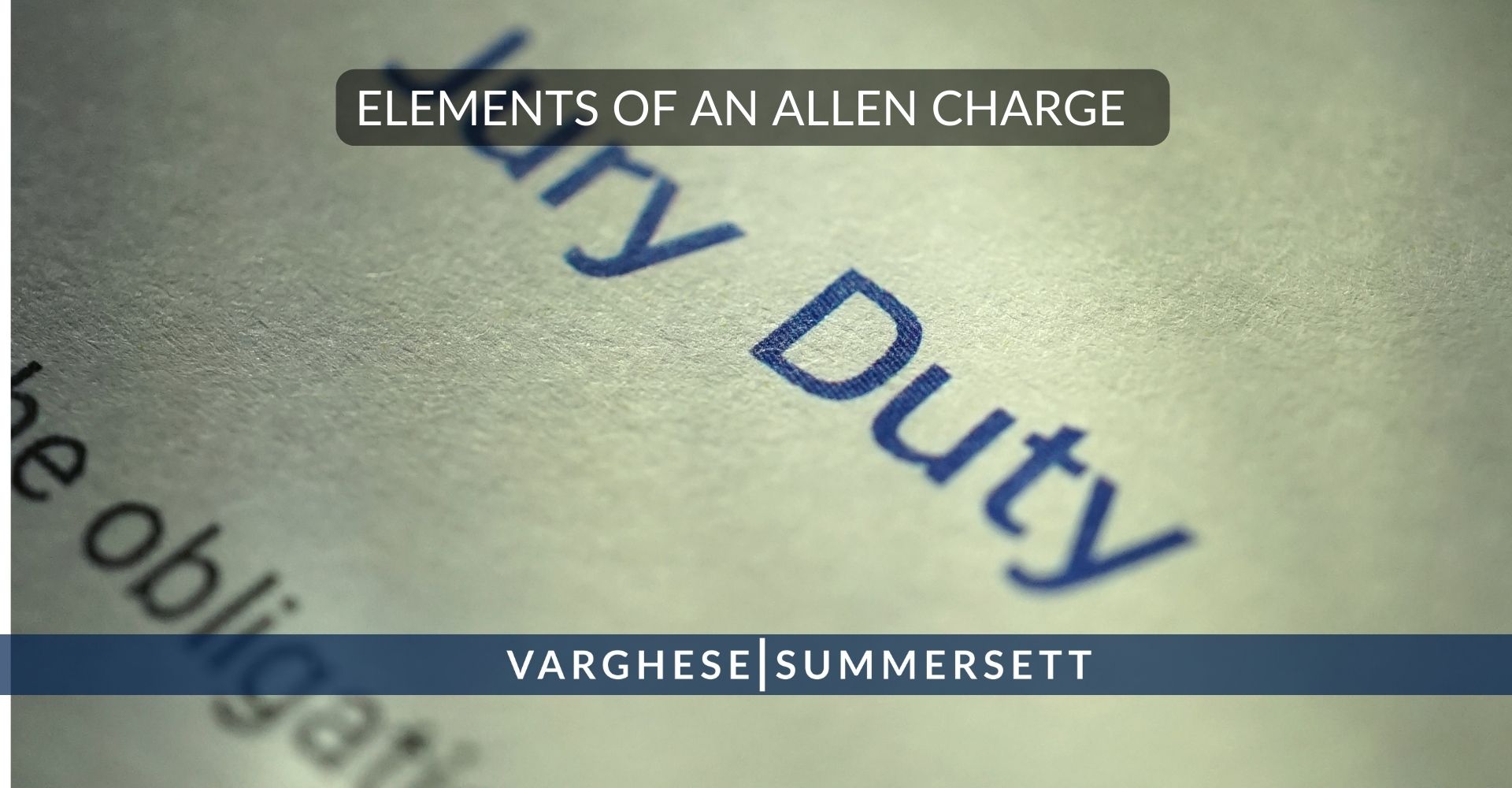What is an Allen Charge?
In most jurisdictions, jury verdicts in a criminal trial must be unanimous, but what happens if deliberations stall or break down? If the jury sends a note saying they are deadlocked, the judge can give them a strongly worded instruction urging them to keep going and to try harder to reach a verdict.
This instruction is known as an Allen charge, also called a Dynamite Charge. In this article, we explain the Allen charge and why this supplemental jury instruction is used to encourage a verdict, as well as the potential consequences and controversies surrounding its application.

The Role of the Allen Charge, or Dynamite Charge, in Jury Deliberations
A jury in a criminal trial in most jurisdictions, including New York and Texas, must be unanimous as to its verdict. This means all 12 jurors must agree on each count as to the defendant being guilty or not guilty? So what happens when a jury cannot agree?
Well, the easy answer is the trial ends with a mistrial based on a hung jury. There is, however, a step that routinely takes place in most jurisdictions before a mistrial is granted based on a jury not being able to make a unanimous decision, and that is the Allen Charge.
Origins of the Allen Charge or Dynamite Charge
The term “Allen Charge” originates from the 1896 U.S. Supreme Court case Allen v. United States. In this case, the Supreme Court upheld the practice of judges giving supplemental instructions to encourage juries to reach a unanimous verdict.
Purpose and Function of the Allen Charge
The main goal of an Allen Charge is to urge jurors to re-examine their positions and work towards a consensus. It reminds jurors of their duty to deliberate with an open mind, considering the views of other jurors, and to strive to reach a unanimous decision, if possible, without compromising their honest convictions.
It’s basically asking the jurors in the minority opinion to evaluate their positions carefully. The jurors are reminded that whatever they do they should not violate their own conscience.

Key Elements of an Allen Charge
Typically, an Allen charge includes the following elements:
- Reminder of Duty: Jurors are reminded of their duty to try to reach a unanimous decision.
- Encouragement to Deliberate: Jurors are encouraged to re-examine their own views and consider the opinions of their fellow jurors.
- Respect for Convictions: Jurors are instructed not to surrender their honest beliefs solely to achieve a consensus.
- Reassurance that no juror should abandon their honest convictions solely to reach a verdict. An emphasis is placed on the duty to reach a unanimous decision if possible, without compromising individual judgment and conscience.
Example of an Allen Charge
Members of the Jury:
I am going to ask that you continue your deliberations in an effort to agree upon a verdict and dispose of this case; and I have a few additional comments I would like for you to consider as you do so.
This is an important case. The trial has been expensive in time, effort, money, and emotional strain to both the defense and the prosecution. If you should fail to agree upon a verdict, the case will be left open and may have to be tried again. Obviously, another trial would only serve to increase the cost to both sides, and there is no reason to believe that the case can be tried again by either side any better or more exhaustively than it has been tried before you.
Any future jury must be selected in the same manner and from the same source as you were chosen, and there is no reason to believe that the case could ever be submitted to twelve men and women more conscientious, more impartial, or more competent to decide it, or that more or
clearer evidence could be produced.
If a substantial majority of your number are in favor of a conviction, those of you who disagree should reconsider whether your doubt is a reasonable one since it appears to make no effective impression upon the minds of the others. On the other hand, if a majority or even a lesser number of you are in favor of an acquittal, the rest of you should ask yourselves again, and most thoughtfully, whether you should accept the weight and sufficiency of evidence which fails to convince your fellow jurors beyond a reasonable doubt.
Remember at all times that no juror is expected to give up an honest belief he or she may have as to the weight or effect of the evidence; but, after full deliberation and consideration of the evidence in the case, it is your duty to agree upon a verdict if you can do so.
You must also remember that if the evidence in the case fails to establish guilt beyond a reasonable doubt the Defendant should have your unanimous verdict of Not Guilty.
You may be as leisurely in your deliberations as the occasion may require and should take all the time which you may feel is necessary…. I will ask now that you retire once again and continue your deliberations with these additional comments in mind to be applied, of course, in conjunction with all of the other instructions I have previously given to you.
Controversy and Effectiveness of the Allen Charge
The Allen charge is controversial because some see it as coercive, potentially pressuring minority jurors to conform to the majority opinion. Critics argue that it can lead to verdicts that are not truly unanimous, as jurors may change their votes due to peer pressure rather than genuine conviction. This has led to its rejection, in whole or in part, by at least 23 states.
Despite the controversy, the Allen charge is still used in federal courts and in some state courts. Its effectiveness in breaking deadlocks and securing verdicts is well-documented, but it also raises concerns about the fairness and integrity of the jury deliberation process.
Further Reading: Cristisim of the Allen Charge, Written in 1972
What if a Jury Still Can’t Reach a Verdict After an Allen Charge?
Despite their efforts, juries sometimes fail to reach a unanimous decision after lengthy deliberations, resulting in what is known as a “hung jury.” When it becomes clear that a verdict cannot be reached, the judge will declare a mistrial.
In such a case, the defendant is neither convicted nor acquitted. The prosecutor can choose to retry the case before a different jury without violating the double jeopardy clause.
In some situations, the state may decide not to retry the case and dismiss the charges. Prosecutors might also attempt to resolve the case through a plea bargain agreement.
Key Takeaways
The Allen charge is a powerful tool in the judicial system, designed to facilitate unanimous jury verdicts and prevent the need for retrials. However, its use must be carefully balanced to avoid undue pressure on jurors and ensure that verdicts are based on genuine consensus rather than coercion.